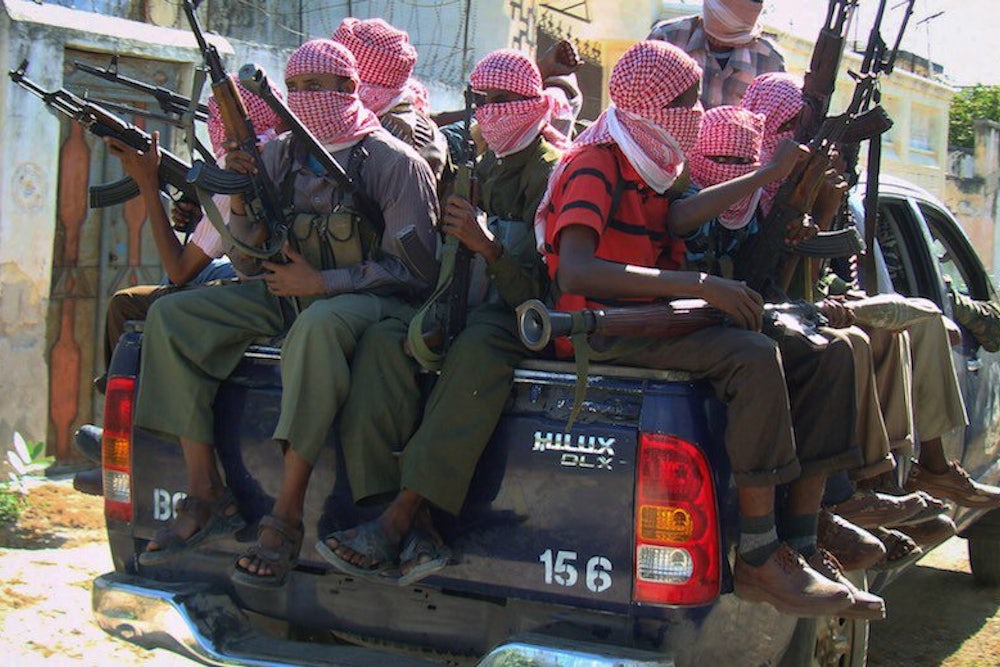Just after the Ford Motor Company made plans to discontinue its two-door Bronco in 1994, the vehicle received an unexpected product placement: That June, ninety-five million people watched O.J. Simpson speed down the L.A. freeway in his white truck, pursued by authorities, to a then unknown fate. According to an article in USA Today last year, the American automaker sold approximately 37,000 Broncos in 1994, about 7,000 more than it had sold the year before. This may have been an O.J.-inspired bump. And today, twenty-one years later, the Toyota Tacoma—fondly known as the "Taco" to its fans—might now be experiencing a similar phenomenon.
Members of the terrorist group ISIS have been spotted driving the Tacoma's predecessor, the Hilux (long beloved by the Taliban), for more than a year now. Saturday Night Live riffed on that in March with a commercial parody showing a recent high school graduate, played by Dakota Johnson, getting dropped off by her father on a street corner where an ISIS-driven Toyota truck (either a Tacoma or a Hilux) fitted with machine guns, is waiting. But not everyone is laughing. There are conspiracy theories and lots of questions about how ISIS obtained the trucks. Stolen from the streets of Sydney, perhaps?
Meanwhile, Tacoma sales have surged. To be clear, the Tacoma—which has its own history of use by American forces in the mid-east—is not the sturdier Hilux, though it did replace the older truck in the United States the year after O.J.’s flight. (The BBC show 'Top Gear' once parked a Hilux atop a twenty-three story building just before it was to be demolished: "Will it be buried under thousands of tons of public housing? No. There it is." After a little fiddling under the hood, it turned on.)
By 2005, the Tacoma had become a "tried and true ... mainstay of the mid-size truck world," in the words of Car and Driver, and the best-selling truck in its category, beloved by outdoorsy types. From June of last year to June of this year, Tacoma sales increased by a greater percentage than any other. An updated, highly-praised version was released in early September—it's "kind of like a Swiss Army knife," a Tacoma marketing manager told the Los Angeles Times last week—and the third-generation Taco looks likely to beguile American truck lovers, too.
Toyota executives seem happily perplexed by the Tacoma's most recent run of success. "We've got a ten-year-old truck that's getting very little marketing support, but has a huge amount of support in the marketplace," a Toyota division general manager told Automotive News in August, before the new model came out. (That executive put the truck's success down to low gas prices and "easy credit.") Little "traditional" marketing, perhaps. But what about the ISIS effect? Could a terrorist group's use of a branded product, or one very similar to it, positively influence consumers?
"This is a more complicated association than the O.J.-Bronco situation," said Kit Yarrow, a former department chair of psychology at Golden Gate University and author of Decoding the New Consumer Mind. "The prolonged exposure we had to the Bronco meant that consumers were forming very conscious impressions. That event took place at a time when people consumed media in a different way: not through snips, but instead through several full seconds, even minutes of viewing,” she continued. “Also, the Bronco was really the star of the show." Toyota, on the other hand, is more in the background of the ISIS photos. Still, Yarrow says, we're influenced by the juxtaposition.
"The sheer exposure will boost the Tacoma," and Toyota trucks in general, "into becoming a considered option for potential buyers who are less familiar with trucks, but there is likely to be a negative association for Toyota to overcome,” Yarrow added. “In the case of O.J., consumers weren't yet horrified, more shocked and interested. If [a Toyota truck] is in the background of a horrific event, the result will be an overwhelmingly negative association. If it’s a static image without violence, the result will be similar to the Bronco event," in which the Ford truck did nothing worse than ferry a former football star along a familiar highway. "All of this happens unconsciously. The result is sort of a jigsaw puzzle of emotional, non-rational associations. I think the net for Toyota trucks will actually be more positive than negative."
Some Taco owners have been consciously grappling with the appearance of their truck—or what appears to be their truck—in the news, driven by men with machine guns on Jihadist missions. A Tacoma message board thread (titled "ISIS/ISIL Official Vehicle: MY TRUCK???") registers a range of sentiments, from enthusiastic patriotism to mild annoyance. Mostly, the thread’s participants seem to enjoy the opportunity to trash rival truck manufacturers. "You'd think since they're a bunch of suicide bombers that they'd drive G.M. products," one post reads. Another: "For tactical advantage, I think our military should arrange a Nissan Titan/Frontier offering to the terrorists."
And still the buyers keep coming. An outdoorsy friend of mine recently decided to purchase a Tacoma. He asked Facebook whether he should buy the long or the short bed version of the truck. (The consensus: short, because it's easier to drive and park.) Deep in the comments on his page, the soon-to-be Taco owner explained the rationale for his purchase: "Every time you see a truck full of warlords driving through inhospitable terrain, it's in a 15-year-old Tacoma. That's dependability,” he wrote. “I figure if a Taco can handle desert war zones, it can handle my ski and mountain bike trips."
